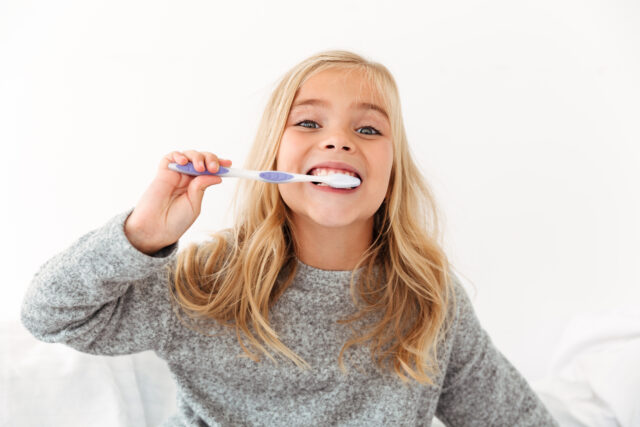
Proper dental hygiene in children is as important, if not more so, than adults. Kids’ dental hygiene and health can determine many factors about their dental health in the future, such as gum health, teeth placement and oral hygiene. Without proper care, a child’s dental routine could cause issues for them later in life. One of the most important factors to determine dental health is establishing healthy habits early on, ones that will carry to adulthood.
1. Regular brushing
Once children have grown a set of baby teeth, they can start brushing at a regular rate. Dentists recommend that children brush their teeth twice a day, just like adults. Some ways to make this more fun instead of a chore is to use a fun toothbrush or flavored toothpaste. Just be sure it does not contain a high level of fluoride, which can be harmful. Parents can also brush their teeth with their kid so it is something they do together.
2. The two-minute rule
Dentists recommend that a tooth-brushing session last two minutes, longer than what most people spend. Establishing this rule is a good way to set healthy habits. That is why it is a great idea for parents to brush their teeth with their child when the child is still learning. Parents can also set a timer for the two-minute rule and reward children with something fun, like a sticker, after brushing for two minutes.
3. Reducing sugar intake
Excessive sugar intake is a seemingly natural part of childhood: candies, cakes and sweets abound. Sugar is bad for teeth, especially in children who have a softer, more sensitive set of baby teeth that are prone to cavities. It is difficult to avoid sugar consumption altogether, but parents can reduce sugar intake by not allowing their child to have soda or candy on a regular basis. Leave cakes and candies as a special treat instead of part of everyday life, and watch how it affects kids’ dental hygiene.
4. Flossing
Many adults do not floss regularly, and it can be assumed that it is because we were not taught to as a child. Teaching children to floss as part of a kids’ dental hygiene routine is important because they are likely to carry that habit with them to adulthood. Children should practice flossing under parent supervision and use specially formulated floss for their age.
5. Dentist visits
It is recommended that children see their dentist at least once a year for a regular checkup. Many children resist this, but you can make it fun by pairing it with a fun activity. For instance, every time you come back from the dentist, your family can have a fun movie or game night. This will help relieve stress if a child has anxiety about the appointment and give them something to look forward to.
6. Rinsing
Though it is not recommended that children use traditional mouthwash, they should learn to rinse their mouths out with water when they brush. This helps get rid of food particles and teaches children to thoroughly clean their teeth when brushing.
7. Adequate calcium intake
Proper calcium is a key contributor to strong bones and teeth, all developed during childhood. You can make sure your child is getting enough calcium by giving them a multivitamin and/or three dairy products per day (milk, cheese, yogurt, etc.).
Healthy habits
Children have the best chance of proper dental hygiene if they are taught young and can carry their habits into adulthood. Brushing, flossing and dentist visits are a great way to ensure your child has healthy dental hygiene later on in life.
Original Source: https://www.canyonridgepediatricdentistry.com/blog/kids-dental-hygiene-7-important-tips/